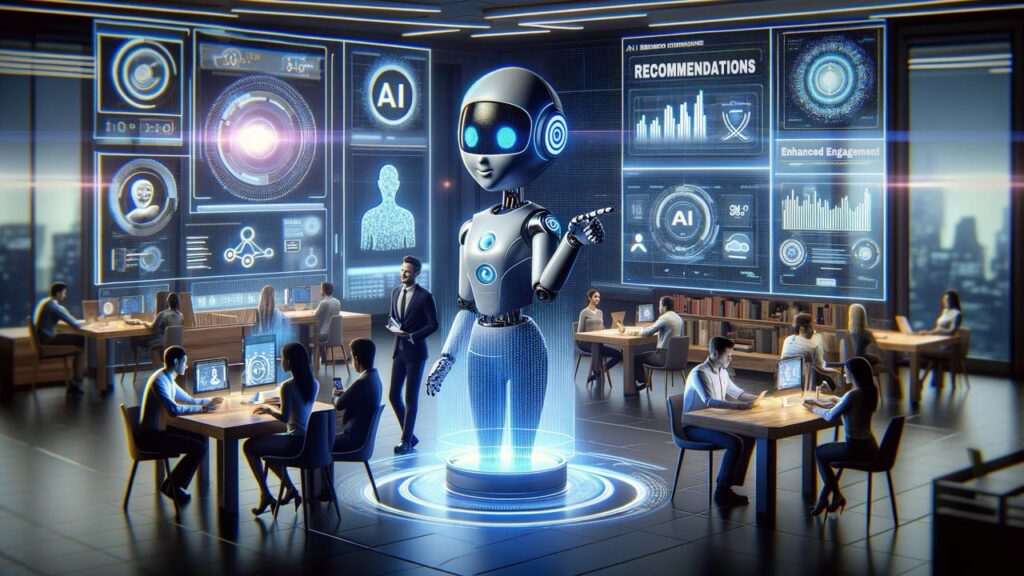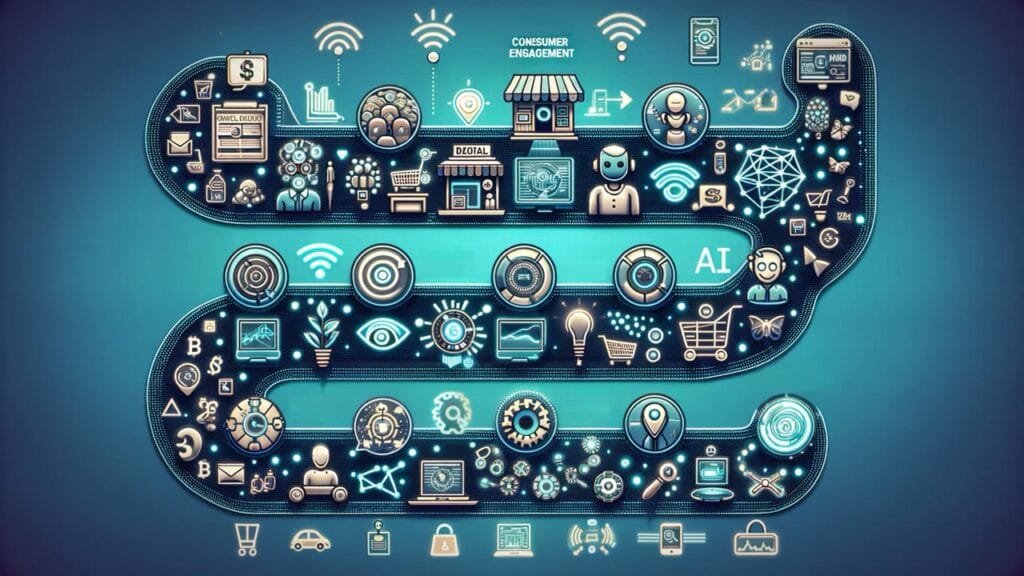AI Consumer Engagement: Harnessing the Power
AI Consumer Engagement in the rapidly evolving world of customer engagement, Artificial Intelligence (AI) has emerged as a transformative force. The journey from traditional engagement strategies to AI-driven approaches marks a significant shift in how businesses interact with their customers. AI is not just changing the tools and technologies used; it’s reshaping the very fabric of customer-business relationships.
In this blog post, we will delve into how AI is revolutionizing consumer engagement, offering unprecedented personalization, efficiency, and insights. From chatbots and predictive analytics to advanced customer sentiment analysis, AI technologies are enabling businesses to connect with their consumers in more meaningful and impactful ways.

Key Takeaways
- Evolving Consumer Engagement with AI: The article underscores how AI technologies, such as chatbots, personalized recommendations, and predictive analytics, are revolutionizing consumer engagement, offering more personalized and efficient customer experiences.
- Innovative AI Applications: It highlights emerging AI innovations reshaping consumer interactions, including voice assistants, AR/VR experiences, and sentiment analysis, suggesting that these technologies will further enhance consumer engagement in novel and immersive ways.
- Strategic Integration of AI: The article emphasizes the importance of businesses strategically integrating AI into their consumer engagement plans. It advises investing in AI capabilities, upskilling teams, and maintaining a balance between AI automation and the human element to build future-proof consumer engagement strategies.
Table of Contents
- The Evolution of Consumer Engagement
- AI-Driven Strategies for Enhanced Engagement
- Innovations in AI and Consumer Interaction
- Building a Future-Proof Consumer Engagement Plan
The Evolution of Consumer Engagement

The journey of consumer engagement is a story of continuous evolution, shaped by technological advancements and changing consumer expectations. Understanding this evolution is crucial for grasping the current landscape and the impact of AI.
Historical Perspective on Consumer Engagement Methods
Initially, consumer engagement was predominantly personal and direct, involving face-to-face interactions in physical marketplaces. With the advent of mass media, engagement shifted towards one-way communication through channels like television and print media. This era prioritized reach over personalization.
Transition to Digital Methods and AI
The digital revolution marked a pivotal shift. The rise of the internet and social media platforms led to a two-way engagement model, where consumers could interact with brands directly. Digital channels provided more data, enabling businesses to understand and cater to consumer preferences better.
The introduction of AI in consumer engagement represented the next leap. AI has enabled a level of personalization and efficiency previously unimaginable. By analyzing vast amounts of data, AI can predict consumer behavior, tailor experiences, and automate interactions, making them more relevant and engaging.
The Impact of AI on Consumer Behavior and Expectations
AI has not only changed how businesses engage with consumers but also transformed consumer expectations. Today’s consumers expect personalized, convenient, and responsive interactions. AI-driven tools like chatbots and personalized recommendations have set new standards in consumer engagement, compelling businesses to adopt AI strategies to meet these expectations.
AI-Driven Strategies for Enhanced Engagement

In the current digital age, AI-driven strategies are at the forefront of enhancing consumer engagement. These strategies leverage AI’s ability to analyze data, predict behaviors, and automate interactions, providing a more personalized and efficient customer experience. Overview of AI Technologies in Consumer Engagement
- Chatbots and Virtual Assistants: AI-powered chatbots and virtual assistants are revolutionizing customer service. They provide instant responses to customer queries, improving engagement and satisfaction.
- Personalized Recommendations: AI algorithms analyze consumer data to offer personalized product or content recommendations, significantly enhancing the shopping experience.
- Predictive Analytics: Utilizing AI for predictive analytics helps businesses anticipate customer needs, preferences, and future behaviors, allowing for more targeted marketing efforts.
Case Studies Showcasing Successful AI Implementation
- A retail company employs AI to analyze customer purchase history, resulting in highly personalized email marketing campaigns that boost conversion rates.
- An online streaming service uses AI algorithms for content recommendation, enhancing user experience and increasing viewer retention.
- A financial services firm implements AI chatbots, reducing response times and increasing customer satisfaction.
Best Practices for Integrating AI into Consumer Engagement Strategies
- Understand Your Audience: Use AI to gather and analyze data on your audience’s preferences and behaviors. This information is crucial for tailoring your AI-driven engagement strategies.
- Balance Automation with Human Touch: While AI can handle routine inquiries and tasks, complex or sensitive issues should be directed to human agents. Maintaining this balance is key for effective engagement.
- Prioritize Data Privacy: When using AI to analyze consumer data, ensure compliance with data privacy laws and ethical standards. Transparency with customers about data usage builds trust and loyalty.
Innovations in AI and Consumer Interaction

The realm of consumer engagement is constantly evolving, with new AI technologies emerging that are set to further revolutionize how businesses interact with their customers. This section explores these cutting-edge innovations and their potential implications for the future.
Emerging AI Technologies Reshaping Consumer Engagement
- Voice Assistants and Smart Speakers: Voice-enabled AI technologies are becoming more common in households. Businesses are leveraging these for voice-based shopping experiences and customer service.
- Augmented Reality (AR) and Virtual Reality (VR): These technologies offer immersive brand experiences. For example, AR can be used for virtual try-ons in retail, enhancing the shopping experience.
- Sentiment Analysis: Advanced AI algorithms can analyze text and voice to gauge customer sentiment, allowing businesses to understand and respond to customer emotions more effectively.
Potential Future Developments and Their Implications
The future holds even more promise for AI in consumer engagement. AI could evolve to offer even more sophisticated personalization, predicting consumer needs before they are explicitly expressed. There’s also potential for AI to create entirely new forms of engagement, such as virtual brand ambassadors or AI-generated content that resonates deeply with individual consumers.
Ethical Considerations and Consumer Privacy
As AI technologies become more ingrained in consumer engagement, ethical considerations and consumer privacy become increasingly important. Businesses must navigate these challenges carefully, ensuring that AI is used responsibly and that consumer data is protected. Transparency in how AI is used and data is handled will be key to maintaining consumer trust.
Building a Future-Proof Consumer Engagement Plan

As businesses navigate the rapidly evolving landscape of AI-driven consumer engagement, it’s crucial to have a plan that not only leverages current technologies but is also adaptable to future innovations. This final section provides guidance on developing a resilient and effective consumer engagement strategy in the era of AI.
Strategies for Businesses to Adapt to AI-Driven Engagement
- Investing in AI Capabilities: Allocate resources to acquire and integrate AI technologies relevant to your business. This includes investing in tools for data analysis, chatbots, personalized marketing, and more.
- Upskilling Teams: Ensure your team is equipped with the necessary skills to work with AI tools. This could involve training existing staff or hiring new talent with expertise in AI and data analytics.
- Staying Informed and Agile: Keep abreast of the latest developments in AI and consumer engagement. Be ready to pivot your strategies as new technologies emerge, ensuring your approach remains cutting-edge.
Balancing AI Automation with Human Touch
While AI can significantly enhance efficiency and personalization, it’s essential to maintain a human element in customer interactions. Use AI for routine tasks and data analysis, but ensure that complex, sensitive, or emotional customer interactions are handled by human agents. This balance is key to building long-lasting customer relationships.
Preparing for Future Trends
The future of consumer engagement with AI is likely to see even more personalized and predictive interactions. Preparing for this involves not just technological readiness but also an ethical framework to guide the use of AI. Businesses should anticipate changes in consumer expectations and be ready to adapt their strategies accordingly.
With these strategies, businesses can build a consumer engagement plan that leverages the power of AI while remaining adaptable and sensitive to customer needs.









Leave A Comment